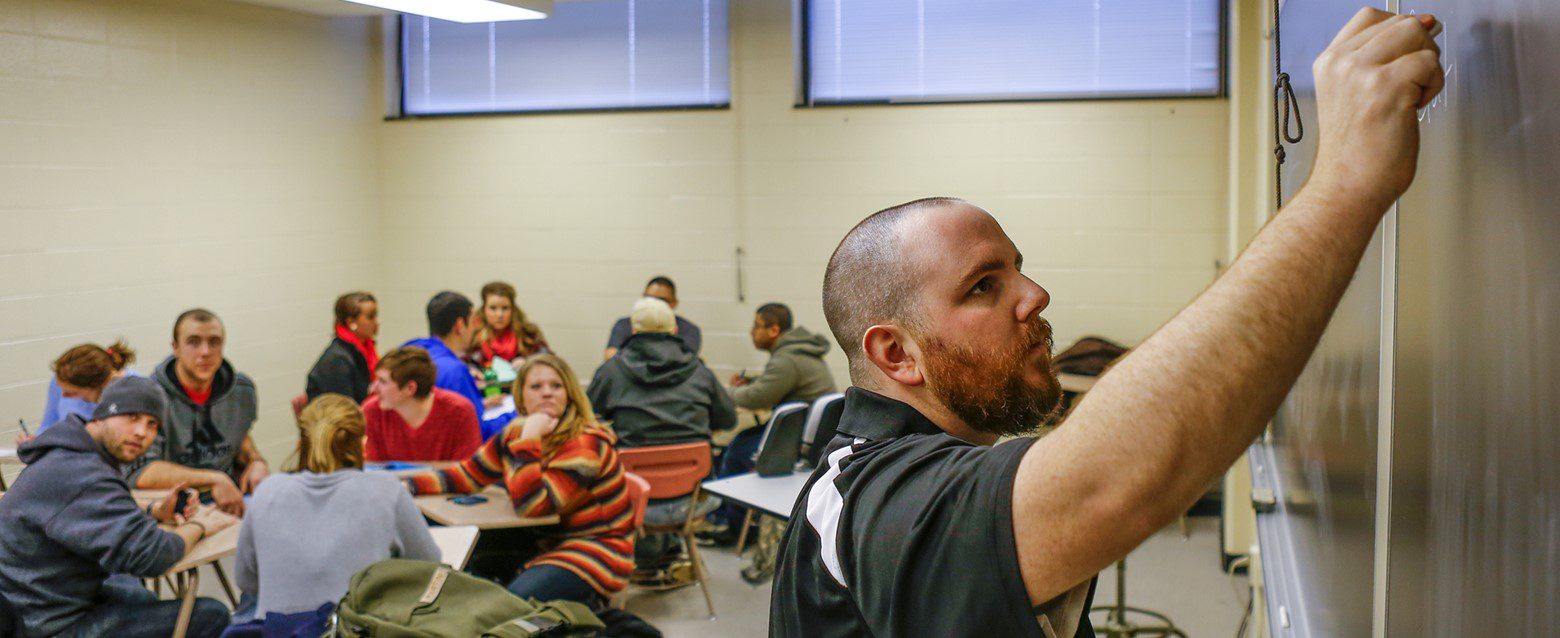
Dr. Travis Martin teaching Veterans Studies 200
VTS 200 Introduction to Veterans Studies now features a video series that teaches students how to use a multi-disciplinary framework to better understand veterans’ experiences, cultures and identities.
Guests include professors of English, Gender Studies, Geography, History, Military Science, Psychology, Therapeutic Recreation and Sociology. Students can also expect to hear from people who have boots-on-the-ground experience such as health care providers, those who have worked with veterans in assisted living facilities, and veterans themselves.
Dr. Martin, creator of Veterans Studies at EKU, comments, “The revisions expose students to ways of thinking critically about military service and veterans’ issues using a variety of disciplinary approaches. They’ll get an introduction to Veterans Studies, and they’ll also learn research methods and ways of thinking about world issues from expert faculty members from across campus. They’ll take one course but learn from more than a dozen different professors.”
This kind of interdisciplinary approach is what makes Veterans Studies applicable and complementary with just about any major area of study at EKU, preparing students to enter the workforce greater understanding of the veteran and military family population.
Nursing and History
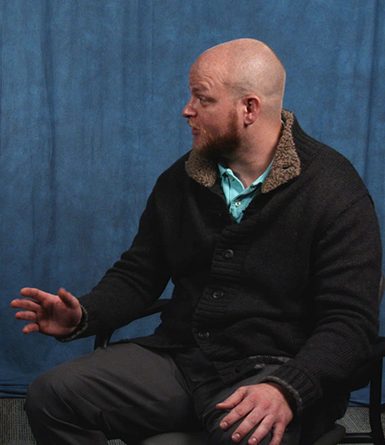
Mike Hays, Lexington VAMC Nurse
Mike Hays is an Operation Iraqi Freedom veteran and registered nurse in the ER at the Lexington, Kentucky Veterans Administration Hospital. He discusses his service in the U.S. Army and how a short “Combat Lifesaver Course” inspired him to pursue a career in the medical field. He provides insights into the return-home experiences of veterans—how veterans must adjust “from an environment where everything is taking place at a 100 mph” to a life where the things move slower and the consequences are not as severe as those found in combat.
For Mr. Hays, his career at the Lexington VA Hospital allows him to “keep serving.” He discusses some of his daily job responsibilities and introduces students to the Nursing field’s “Theory of Goal Attainment” developed by Imogene King. This theory is useful to Veterans Studies students who hope to evaluate personal, interpersonal, and social interactions in the lives of individual veterans. Mr. Hays encourages students to “hit the books and read the stories written by veterans.” More importantly, perhaps, he implores students to seek out veterans themselves by engaging in volunteer work or visiting veterans in VA hospitals located throughout the United States.
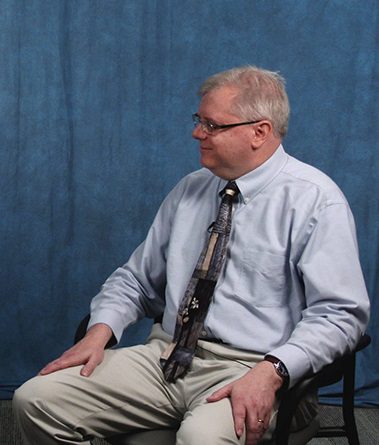
Dr. Brad Wood, EKU History Professor
Dr. Brad Wood is a Professor of History at EKU who explores (among other things) veterans’ return-home experiences in VTS 350 War and American Society. He introduces such concepts as “contingency” and “agency,” providing Veterans Studies students with ways to examine texts, articles and issues from a historical lens, one Dr. Wood describes as “the study of people experiencing and reacting to change over time.” For Veterans Studies students, examining a historical event as contingent allow them to see how the world is interconnected and historical events never have a single explanation.
Regarding agency, Dr. Wood reminds students that, when they view primary sources or historical events through the eyes of those who were there, it is important to remember that people in the past, like today, do not see the future as predetermined. He also provides some valuable advice to scholars regarding the use of primary and secondary sources and discusses ways to evaluate the merits of competing arguments in the field of History.
Geography and Gender Studies
Dr. Eugene Palka served more than 33 years in the U.S. Army as a commissioned officer, including 13 years at the U.S. Military Academy at West Point. He was a Professor and Chair of the Geography Department and deployed to both Afghanistan and Iraq, providing guidance to military leaders about the intersections between cultural, historical, and environmental forces as they pertained to the overarching mission of coalition forces. Dr. Palka specializes in a sub-field known as Military Geography.
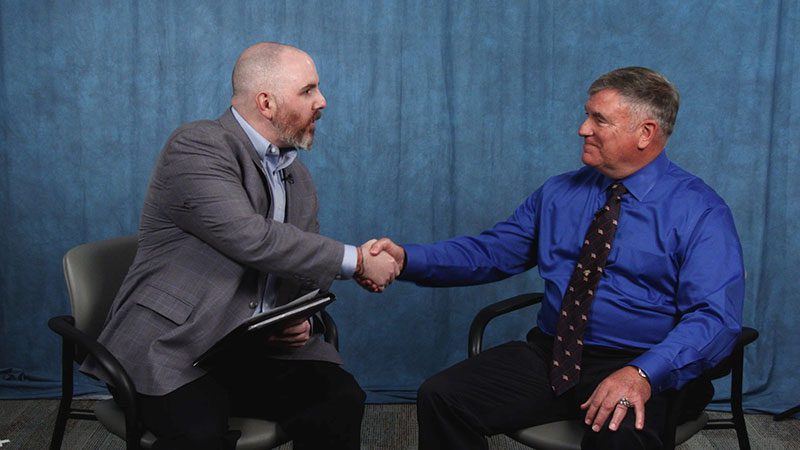
Dr. Travis Martin interviews Dr. Eugene Palka
VTS 200 students learn about the field of Geography as well as basic concepts such as “cultural landscapes” and “activity mapping.” In Geography, “cultural landscapes” refer to the intersections and interdependencies that exist between human cultures and natural landscapes. “Activity mapping” refers to the process of monitoring and recording an individual or group’s interactions within an environment. Veterans Studies students, for example, might use the concept of a “cultural landscape” to discuss how the cultures of returning veterans intersect with the cultures of other sub-groups and natural landscapes in their home communities, both historically and in the present. They could employ “activity mapping” in exercises examining the behaviors and routines of returning veterans with an eye toward psychosocial well-being.
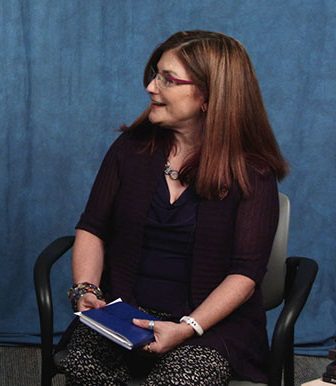
Dr. Lisa Day, EKU Gender and Cultural Studies Professor
Dr. Lisa Day oversees instructors and curricula in Women and Gender Studies and Appalachian Studies. In fact, Veterans Studies fell under Dr. Day’s purview before moving to the Department of Psychology last year. In addition to her work revising Veterans Studies curricula and facilitating events for students in the program, Dr. Day has served as an editor for the non-profit organization, Military Experience and the Arts. She worked with hundreds of veterans and their families to publish short stories, artwork and poetry in a number of edited collections. Dr. Day brings to VTS 200 a unique blend of academic and experiential perspectives.
VTS 200 students learn about concepts from gender and identity theory such as “performativity” and “intersectionality.” Drawing upon theorists such as Judith Butler, Dr. Day discusses how gender is a socially-constructed concept used in the performance and maintenance of identity. Active duty troops, in particular, perform a unique form of “military masculinity” replete with patterns of speech and behaviors derived from a combination of training and experience. After military service, these same troops sometimes find that the identities they perform result in alternating experiences of privilege and oppression. In other words, their identities result in statuses within larger social hierarchies that are inherently political. Helping Veterans Studies students understand identity as performative enables them to critically discuss the symbolic roles veterans serve within larger society.
Dr. Day also explains intersectionality, a foundational concept used in the field of Veterans Studies. Intersectionality, a term first coined by Kimberlé Crenshaw, examines an individual or group from an intersectional lens, defining identity through myriad factors such as race, ethnicity, socioeconomic background, gender, sexual orientation, and, of course, veteran status. Veteran identity is non-monolithic. No two veterans share the exact same experience because the make up of each veteran’s intersectional identity is unique. VTS 200 students, for example, might apply an intersectional lens to psychological case studies of members of the military or veteran characters in films or works of fiction. They might discuss how one veteran’s experience differs from another’s due to the ways in which veteran identities intersect with other factors such as race or gender.
From Geography to Gender, Drs. Palka and Day reveal the interdisciplinary nature of Veterans Studies. They’re also examples of the wealth of expertise and knowledge found among EKU’s faculty and staff.
Psychology and Sociology
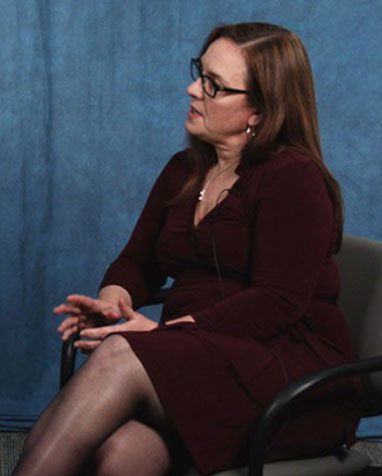
Dr. Melinda Moore, EKU Psychology Professor
Dr. Moore’s (right) research focuses on suicidology and post-traumatic growth. The Department of Veterans Affairs reports that more than 6,000 veterans completed suicide between 2008 and 2016. Protracted wars in the Middle East, stigmas surrounding war’s invisible wounds, and veterans’ expressed feelings of isolation and alienation have resulted in an epidemic among current and former service members. Exposure to Dr. Moore’s research better prepares students to separate fact from fiction, locate support services, and recognize the warning signs of suicide.
Post-traumatic growth refers to an individual’s ability to survive a traumatic event and develop resilience in its aftermath. Dr. Moore co-authored a study alongside Dr. Jerry Palmer for the Tragedy Assistance Program for Survivors (TAPS), an organization supporting the needs of those who lose loved ones to suicide. The study showed support groups and peer-mentoring result in forms of post-traumatic growth that include improved mental health outcomes. Students in VTS 200 learn about Dr. Moore’s research methodology and basic skills from the field of Psychology. They explore the psychological outcomes of military service and its influence on mental health, both in veterans and their communities.
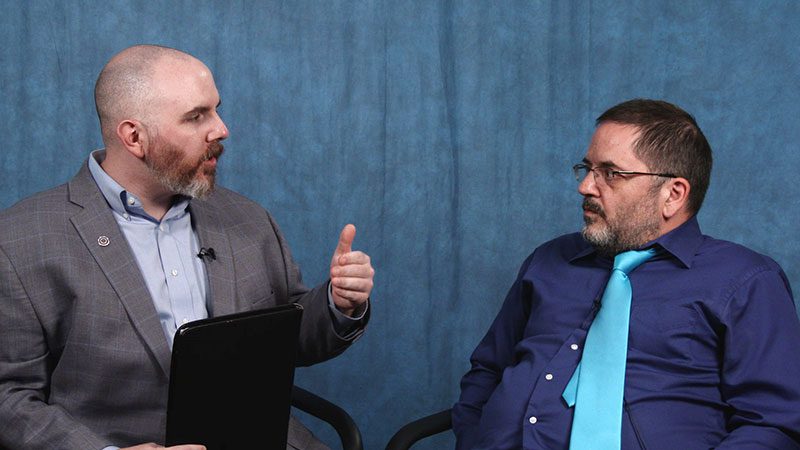
Dr. Travis Martin interviews Dr. Paul Paolucci
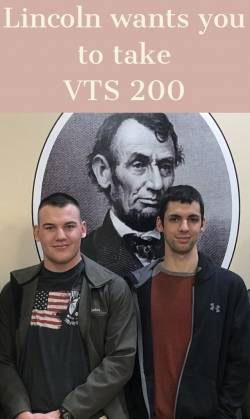
Students pose with a promotional Veterans Studies poster
The sociological imagination is an idea that was proposed in 1958 by C. Wright Mills. Dr. Paolucci teaches Veterans Studies students to use the concept in conceiving of a veteran’s place within larger historical events and social contexts. In other words, veteran identity is determined by experiences that occur within a larger web of external factors: politics, economics, social hierarchies, wars and public attitudes. These factors vary by historical periods and population sub-groups, influencing the experiences of veterans before, during, and after military service. In VTS 200, students learn to identify the external factors influencing veterans’ return home experiences. They learn to contextualize individual veterans and veteran sub-groups using tools from the field of Sociology.
Each expert interviewed for the course teaches foundational concepts from their disciplinary and experiential backgrounds, equipping students with the skills they need to go out into the world and make it a better place for veterans of the U.S. Armed Forces. Along with other contributors, they make the reimagined Introduction to Veterans Studies course a once-in-a-lifetime opportunity to learn about military veterans and their roles in larger society.